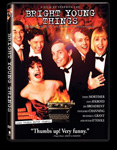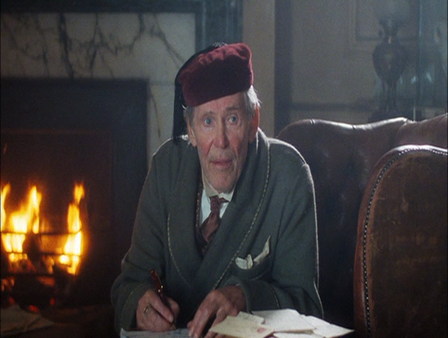 BUY IT AT AMAZON: CLICK HERE!
BUY IT AT AMAZON: CLICK HERE!
STUDIO: New Line
MSRP: $27.95 RATED: R
RUNNING TIME: 105 Minutes
SPECIAL FEATURES:
• Director Commentary
• Stephen Fry: Director
• From the Bottom Up: The Making of Bright Young Things
Remember the high-school
drama kids, and how they took part in those pompous theatre productions?
No? Well, consider yourself lucky.
As for those who do know what I’m talking about,
a caveat – Stephen Fry’s Bright Young
Things, a witty yet inconsequential satire, is the apotheosis of such smug
pretension.

"Oh, Troy?" Matinee or Evening?
The Flick
Adam Symes, a wannabe
writer, comes to
for his book, Bright Young Things. The period is the 1930’s, and the conflicts
raging around
premier party girl and source of infatuation, hinges on the size of his wallet
– both running joke and source of conflict.

It was only now – driving – did she understand the mysterious details surrounding her grotesquely sqaushed childhood cat in the driveway.
overbearing, Bright Young Things
opens with a frenetic, kinetic intro that showcases Fry has considerable visual
panache. The numerous secondary
protagonists – Agatha (Coke-head), Miles (Raging Queen), and Nina (Material
Trophy Girl) dance freely in a decadent costume ball. Fry shoots the scene with red hues and a
dizzying, handheld camera to capture the vivacity of the moment. Outside, Photographers clamor for the latest
image of stars doing naughty things and Fry focuses on one’s quest to sneak
inside. He cuts between the hectic party
inside and the fervor to get inside, with the photographer’s search for a
fallen invitation. The whole scene has
an exhausting feeling, which successfully pins us onto the film. The rest of the film, more then likely to the
limited budget is less daring with only a few more moments of such directorial
electricity. The transition of news stories from experience to print for Lord
Monamark (an over-the-top Dan Aykroyd playing an egotistical, boss Tweedish
newspaper mogul) being another one of notice.
Making up for the
occasional directorial blandness, Fry wisely utilizes the strengths of his
many stage actors and lets them carry the film.
Stephen Campbell Moore as Adam makes a smashing debut. He doesn’t fall victim to the over-acting
that often plagues stage performers and effortlessly relays Fry’s witty
banter. In fact, if there is one area of
not worthy of dissention it is the acting.
The ability of these actors to even evoke a tiny bit of sympathy with
such detestable characters is testament to their talent. Look for James McVoy as the suicidal tabloid
reporter Lord Balcain, whose feeling of loneliness resonates most.

Adam was downright mean in his rigid quest for bad movie experience vigilance.
Still, despite such brief
moments of sympathy. The film is too
tonally abrupt and far too dull for a full out recommendation – funny here, emotional
there, not sure here. It succeeds on
many important levels such as acting and directing, but the overall script is
episodic. Each scene feels like a tiny
unfinished sit-com. It isn’t bad, the
dialogue is exceedingly sharp at times and there are many moments that will
elicit a slight chuckle or a slight grin (the race-car sequence). And to be honest, if the film managed to at
least keep the buoyancy of the first two acts, I’d rate it much higher, but as
it stands the last act runs out of steam.
When the war begins and Adam ends up dodging bombs, Fry switches from
satire to moral dramatizing. Sadly, he
is unable to make a smooth transition, rendering the last third bumpy.

A Home at the End of the World…. Unrated Edition.
In the end, I can’t say
how great a job Fry does adapting the novel upon which Bright Young Things is based, but I must say that the film’s desire
to never bore the audience causes some painfully thin characterizations. Maybe, the novel was similar and Fry merely
stayed faithful. Nonetheless, Fry’s
sympathy and sincere affection belies this decision. If Fry wishes for us to care for his
creations, he should have made them richer.
As it stands he wishes the best of both worlds – the cynicism with the
pathos – and ends up nullifying himself out, making Bright Young Things nothing more but an occasionally witty film
that succeeds all to well at being sublimely insignificant.
6.0 out of 10
The Look
Not particularly rich in
the visuals department, the film neither suffers in the transfer or stands
out. It is merely adequate and
serviceable. There is a very occasional
loss of quality to scenes with many colors. The opening suffering the most, but
most of the time this period piece captures the atmosphere of the era well.
7.5 out of 10
The Noise
Dialogue heavy, the
theatrical banter comes out quite well and is easy to understand. The loud parties and minor war sequences also
come out strong.
7.0 out of 10
The Goodies
We get traditional
featurettes, an aptly vain look at the director, hailing him as a man of many
talents. There is also an interesting
making of with the head production runner following the growth of the
film. It’s better than the typical
As for the commentary, Stephen Fry displays
himself to be a smart British chap with a semi-interesting one. He talks about the difficulties of adapting
and how he got some of the more well known stars to take the small roles. He also explains the reasons and difficulties
of shooting some of the more complex scenes such as the ballroom and the
opening party. Still, it can be dry at
times, Stephen is very, very British (zzzzzzzzzzz), but if you’re a fan of the
director it is a decent listen.
All in all, an okay set of
features for a film you’ve likely not seen.
The fact that New Line put had this many is a blessing considering the
box office take for the film.
7.5 out of 10

………………………………
The Artwork
The original poster with
Ebert proclaiming the film “Very Funny!”
Thankfully, it isn’t a bunch of floating heads, but rather a flaming typewriter
surrounded by the main stars waist up, having a golly good time! Bloody
mediocre!
6.5 out of 10
Overall: 7.0 out of 10